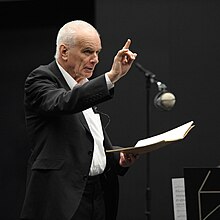| Taverner | |
|---|---|
| Opera by Peter Maxwell Davies | |
 The composer in 2012 | |
| Librettist | Peter Maxwell Davies |
| Premiere | 12 July 1972 Royal Opera House, London |
Taverner is an opera with music and libretto by Peter Maxwell Davies. It is based on the life of the 16th-century English composer John Taverner, but in what Davies himself acknowledged was a non-realistic treatment.[1] The gestation for the opera dated as far back as 1956 during Davies's years in Manchester, and continued when he went to Princeton University in 1962. Davies produced several instrumental works related to the opera during this gestation period, including the Points and Dances from 'Taverner' and the Second Fantasia on John Taverner's "In Nomine".[2] Davies had completed the opera in 1968, but lost parts of the score in a fire at his Dorset cottage in 1969, which necessitated recomposition.[3] Davies completed the opera in 1970.
Davies employs a theme from the 'Benedictus' of Taverner's Mass Gloria Tibi Trinitas as a recurring motif throughout the work. This theme, taken from the section beginning 'in nomine [Domini]', gained popularity among later composers of the English renaissance in the form of the instrumental In Nomine. Stephen Arnold has written a detailed analysis of the music of the opera and of Davies's use of parody.[4] The American composer John Harbison has published an analysis of the opera (working from the vocal score), contemporary with its first performances.[5] Gabriel Josipovici has commented on the historical events that inspired the opera and on the libretto itself.[6]
- ^ Davies, Peter Maxwell, "Taverner: Synopsis and Documentation" (1972). Tempo (New Series), 101: pp. 4–11.
- ^ Swan, Peter, "Recordings: Peter Maxwell Davies" (June 1973). Tempo (New Series), 105: pp. 32–37.
- ^ Walsh, Stephen, Interview with Peter Maxwell Davies on Taverner (July 1972). The Musical Times, vol. 113, no. 1553. (July 1972), pp. 653–655.
- ^ Arnold, Stephen, "The Music of Taverner" (1972). Tempo (New Series), 101: pp. 20–39.
- ^ Harbison, John, "Colloquy and Review: Peter Maxwell Davies' Taverner" (Autumn–Winter, 1972). Perspectives of New Music, 11 (1): pp. 233–240.
- ^ Josipovici, Gabriel, "Taverner: Thoughts on the Libretto" (1972). Tempo (New Series), 101: pp. 12–19.